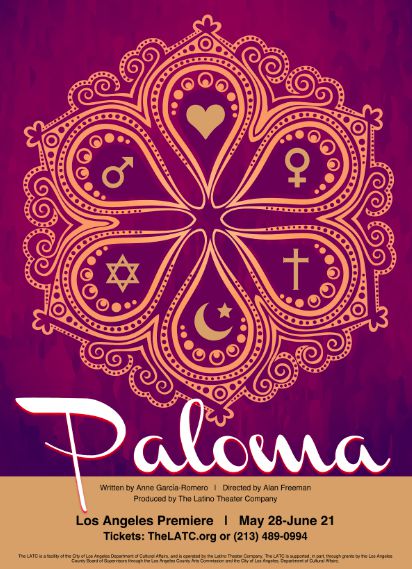“Paloma,” a play by Anne Garcia-Romero, depicts Ibrahim, a dedicated Muslim, meeting Paloma, a lively, culturally Catholic Latina, whose family came to New York from Puerto Rico.
Both students at NYU, they fall in love while studying an 11th century manuscript on courtly romance by the gifted Islamic historian and theologian, Ibn Hazm. Citations from his text projected above the stage are used almost biblically to thematically underscore each scene.
Ibrahim has great respect for Ibn Hazm’s descriptions of refined, courteous love and is steadfast in maintaining his chastity. Paloma, while enjoying the beauty of the work, is not. Intriguingly, the first act is not so much an exploration of seduction as it is a playfully romantic dance of manners.
In the second act, at Ibrahim’s insistence, he and Paloma travel to Andalusia, the area in Spain captured by Muslims during the Middle Ages, where a high Islamic culture flourished for centuries. There they plan to consummate their love. Instead, a bomb explodes the train on which the two are travelling. Ibrahim, though gravely injured, survives; Paloma does not.
Returning to New York, Ibrahim is enmeshed in a civil suit instigated by Paloma’s bereaved father, who is alleging that Ibrahim kidnapped the girl. For his defense Ibrahim turns to his lifelong friend, Jared, a Jewish lawyer who has long envied Ibrahim. In his devastation, Ibrahim is sustained by visions of Paloma.
A century ago, “Paloma” might well have been written along the lines of “Abie’s Irish Rose.” This famously long-running play hilariously examined the topsy-turvydom introduced into the lives of Jewish and Catholic families in New York City when their children fall in love and decide to wed.
The laughs arose from the attitudes of both families, fervent in their differing doctrines and traditions eventually — if grudgingly — learning to respect each other whilst remaining true to their beliefs. For decades, in a past era, this comedic concept served Broadway plays and Hollywood movies quite well.
In our present edgy, irreligious, intolerantly secularist age, this plot device seems to work only when attired with angry truculence drenched in profanity. Despite this, and the lack of a satisfactory conclusion, there are many instances of great beauty in “Paloma.” One saving grace is the visions of Paloma sustaining Ibrahim.
Paloma means “dove” in Spanish. Audience members may come to think of these visions as inspirations of the Holy Spirit, so often portrayed in art as a dove.
The difficulty with this idea is that Muslims reject Trinitarian notions. The meaning behind the play’s title is found in a discussion between Ibrahim and Jared about the dove sent out by Noah after the deluge to ascertain if the land is once again hospitable for human habitation.
This said, Alan Freeman’s direction has so light a touch as to seem excellently non-existent. Anne Sheffield’s simple set design allows audience members to indulge their imaginations. This is neatly enhanced by Trevor Norton’s superlative lighting.
There are three actors in this play and each is magnificent. Ethan Rains expertly brings a stoic yet nobly gentle heroism to his role as Ibrahim. Armed with an infectious smile, Caro Zeller deftly projects deep yet earthy love as Paloma. In a difficult role, Jesse Einstein displays effortless professionalism as Jared.
Surenna Saffari’s beautiful guitar music is a perfect accompaniment to this show and it would not hurt if there were more of it.
Ms. Garcia-Romero’s introduction of role-reversal, i.e., a predatory female pursuing a demur male, is a welcome slant. Understanding the necessity for romantic tension, it is annoying that the Catholic Paloma is portrayed so promiscuously, so quick to offer her body as a token of her love, and so happy to dismiss Catholic precepts learned as a child as merely “legalistic.”
Paloma, portrayed as knowing only a few trappings of the faith, is entirely ignorant of the loving eucharistic presence of Jesus, the true touchstone of Catholic identity.
This is, to be sure, an unhappily accurate reflection of a too-large percentage of Catholics today, products of largely un- or misinformed parents who, themselves, suffered through and ultimately rejected bland, mediocre and at times inaccurate presentations of Catholic belief served up by teachers whose only achievement has been a spectacular failure to pass on the beauty of Catholic spirituality.
Despite her being an assistant professor at the University of Notre Dame, I doubt that Ms. Garcia-Romero actually meant to convey this widespread lack of spiritual conviction amongst Catholics as the greatest tragedy found in “Paloma.”
“Paloma,” a production of the Latino Theater Company, is performed Thursday-Saturday at 8 p.m., and Sunday at 3 p.m. at Los Angeles Theatre Center, Theatre 4, 514 S. Spring Street, in Downtown Los Angeles 90013. Parking, two doors south, is $7.
“Paloma” runs through June 21st. RSVP at (213) 489-0994 or, toll-free at (866) 811-4111. For online ticketing, go to www.thelatc.org.

